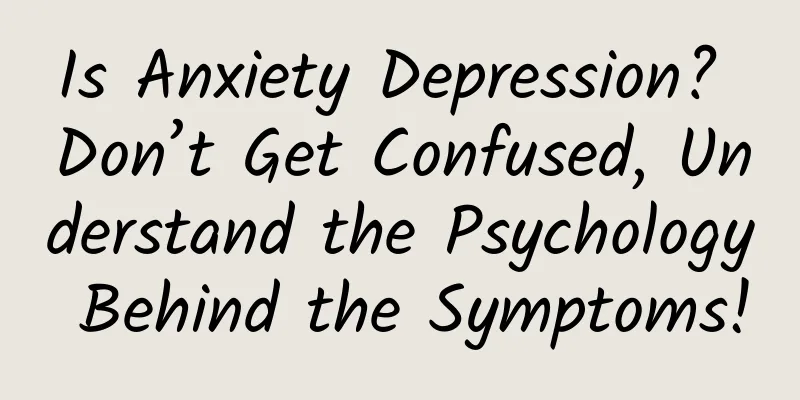Is Anxiety Depression? Don’t Get Confused, Understand the Psychology Behind the Symptoms!

|
In our lives, almost everyone has experienced the feeling of anxiety. Depression is also a mental illness with a high incidence in recent years. So, are anxiety and depression the same? When you feel anxious, does it mean that you have depression? Indeed, anxiety and depression have many similar symptoms, such as low mood, loss of interest, insomnia, sadness, etc. People with anxiety disorders will experience depression, and people with depression will also experience anxiety . More than 95% of people with depression will experience anxiety, and nearly 50% of them can meet the diagnostic criteria for anxiety disorders. However, anxiety and depression are different. Anxiety and depression can occur one after another or at the same time. Anxiety is a kind of irritable emotion caused by excessive worry about the safety of life, future and fate of relatives or oneself , which includes anxiety, worry, sadness, tension, panic and uneasiness. It is related to critical situations and unpredictable and difficult to deal with events. When the problem is solved, the anxiety may be relieved. Depression is a disease state characterized by low mood, slow thinking, reduced and slow speech and movement . In terms of psychological characteristics, anxious people are more likely to worry about the near or long-term future, worry extremely about what is going to happen, and try to avoid or resolve dangers. They have a sense of lack of control over things that go wrong and worry about their physical condition. Depending on the nature of the anxiety, the psychological characteristics will also vary. For example, people with generalized anxiety disorder (GAD) may show frequent worries about some unpredictable danger or misfortune that may happen in the future. People with social anxiety disorder (SAD) are more likely to fear negative evaluation or rejection from others and are afraid of meeting new people or other socially challenging events. The psychological characteristics of depression are mainly hopelessness , excessive sadness and self-blame for things that have happened, and the belief that nothing positive will happen in the future. In cases of moderate to severe depression, suicidal thoughts may occur . From the symptom point of view, anxious people will have difficulty concentrating due to excitement or too many thoughts, or have difficulty falling asleep due to confusion or other physical symptoms. At the same time, they will also experience dizziness, gastrointestinal discomfort (such as nausea, diarrhea or constipation), increased heart rate, increased blood pressure, sweating, muscle tension, shortness of breath, etc. It generally does not affect normal activities, but is more of a restlessness. Depressed patients will also have difficulty concentrating and insomnia. In addition, they will not want to move, move or speak slower than usual, and experience unexplained body pain. Therefore, in our daily lives, occasional anxiety is normal and does not mean that we have depression, so we don’t need to worry too much. However, if persistent anxiety seriously affects our life and work, we should pay special attention. Whether it is anxiety or depression, it means that there is a problem with our mental state. We can relieve or treat the symptoms by communicating with family and friends, consulting a psychologist, etc. |
<<: What should parents do if their child has a fever?
Recommend
Fishy odor in private parts
The vagina is the most private part of the female...
Treatment methods for breast hyperplasia, Chinese medicine prescriptions are effective
Breast hyperplasia is a common breast disease in ...
How to conceive with a retroverted uterus? Four easy steps
Retroverted uterus means there is a problem with ...
Will removing the IUD affect pregnancy?
As people's demands for quality of life are g...
How to practice to have a slim waist with a protruding front and a curved back?
Every woman hopes to have a good figure, because ...
How to use fingers to insert medicine for gynecological inflammation
There are many treatments for gynecological infla...
Can “removing nasal conchae” cure rhinitis? Be careful of nasal erosion! The key to preventing and treating rhinitis is…
gossip Recently, a doctor from a certain hospital...
Does teratoma require surgery?
Congenital diseases are still too scary for human...
Can uterine prolapse recover?
Women will encounter various unexpected problems ...
Is it harmful to wear nail polish during pregnancy?
Pregnant women are generally in a weaker state be...
Breastfeeding mothers must avoid foods that cause bloating
Many pregnant mothers always feel that their bodi...
What are the benefits of drinking green tea for women
Green tea is a beverage that many people are fami...
I had a dull stomachache the day after the transplant.
In vitro fertilization (IVF) is an important step...
Do not take surgery for breast nodules lightly
For women who have breastfeeding experience, the ...









